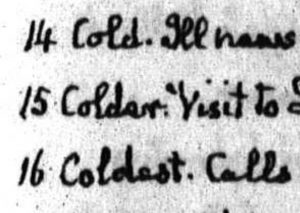By Alyssa Machajewski, Adams Papers Intern
John Adams once suggested to his son, an 11-year-old John Quincy Adams, that he start a journal to record the events of his life. Displaying a level of discipline that must surely be genetic, John Quincy followed his father’s advice consistently for over 68 years. He kept multiple diaries, including a line-a-day version that consists of a single-line summary of each day.
Because of his busy schedule, John Quincy Adams would record this brief summary and then later write out the long-form entry using the line-a-day as reference. I can sympathize with how difficult it would be to keep up with, as I took up bullet journaling only last year (which has a similar organizational idea as JQA’s diary) and I find it exhausting.
Part of my internship experience with the Adams Papers editorial project is to help transcribe some of the 15,000+ pages of JQA’s diary. Luckily, JQA has exceptionally neat handwriting (as long as you can read cursive) and the work is really more like a puzzle that needs solving.
When I first started transcribing the diary, this puzzle was my main interest. I never expected to have anything in common with the journal content or the man behind it. I knew John Quincy Adams as a career politician, the son of a Founding Father, and a president. Surely, his daily life looked nothing like mine, but then I reached about halfway down the line-a-day diary entries for January 1795.

And I laughed; 227 years after writing it, John Quincy Adams made someone laugh. I transcribed this passage in February 2021, just as I and the rest of my home state of Texas were experiencing the coldest winter in living memory. That serendipity changed how I saw the person behind the lines of cursive. JQA became more than a distant historical figure. He was more human somehow—someone who complained about the cold.
We have our obvious differences. I am a recent college graduate and, at the time, he was the U.S. minister to the Netherlands. He lived through an invasion by the French, while I’m living through a global pandemic. However, there were parts of his life that were not difficult at all to relate to. JQA goes on walks (2 March 1795). He sometimes struggles with “Laborious and unsuccessful writing” otherwise known as writer’s block.

He gets anxious when people don’t answer his letters. And, every two months or so, he buys books (I’m jealous of this frequency!) and will sometimes make a note of what he’s finished reading: “Read the private life of the Marechal de Richelieu; and Voltaire” (22 April 1795). Although we have vastly different bookshelves, I love that buying books is still worthy of a diary entry. “Attended the sale of books the whole day, purchased a considerable number. Walk in the Evening alone. Music at home.” I wonder if he’s ever slightly embarrassed that he has gone and bought more books when he knows perfectly well he has a stack of unread ones at home. Still, I can’t help but imagine him grinning as he walks down the streets of The Hague with his armful of books. It is exactly what I would do.
In the six-month span that I have transcribed so far, I can see the skills that led him to be known as a diplomatic president. He negotiated for the release of an acquaintance and French prisoner of war (14 July 1795). He also “disallowed” (i.e. kicked out) French soldiers from his house when they tried to forcibly quarter there (11 March 1795). It is the sort of thing the U.S. Constitution frowns upon and I would like to have been present for that conversation. His diary recorded the following:
The municipality this morning sent a couple of french soldiers to quarter in the house of Mr: Jehu where I am lodged. They have tried the experiment three or four times; and as often the french Commandant of the City upon my application has ordered them to allow the exemption to which the usage of Nations entitles me.
And of course he also noted important historical events, such as on 17 May 1795: “Weather beautiful. Morning and evening walks . . . The Treaty with France signed at 2. AM.”
Working through the diary now feels less like a puzzle and more like a story and a life unfolding. How lucky that we get the chance to see it. To start your own search, visit the John Quincy Adams Digital Diary!


My Dutch grandfather left nearly a life-long diary, including an entry the night before he suffered a stroke at breakfast from which he never recovered. Often amazing events are simply stated. An example might be something like “Pearl Harbor in Hawaii was attacked today.” As an Adams on my grandmother’s side, and cousin of JQA, I have read a great deal of what he wrote and what has been written about him. But this post is a reminder that sometimes the simplest phrase tells enough; I’m glad to realize grandpa’s diaries aren’t so “oversimplified” after all – good enuf for JQA, good enuf for FPVM.
Thank you for writing. We are happy you enjoyed this post. Alyssa makes some great connections between her own experiences and those of JQA. And yes, sometimes the simplest phrase is enough.
We Adams family members, and descendants, are still following in JQA’s footsteps in multiple ways… buying more books for an already too-tall stack is in our genes. Letter writing is one of our best traits, we love to send and receive mail! Thank you Alyssa and to your colleagues for all your hard work on this fabulous project. I find his hand-writing more difficult than you seem to, but I imagine you’re younger than I! Keep up the great work!